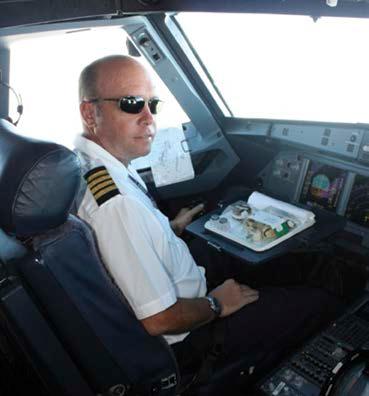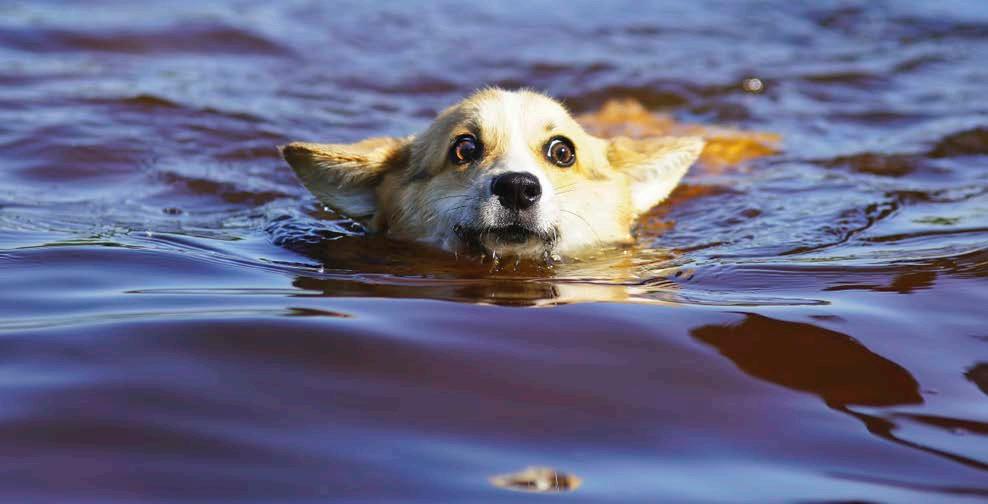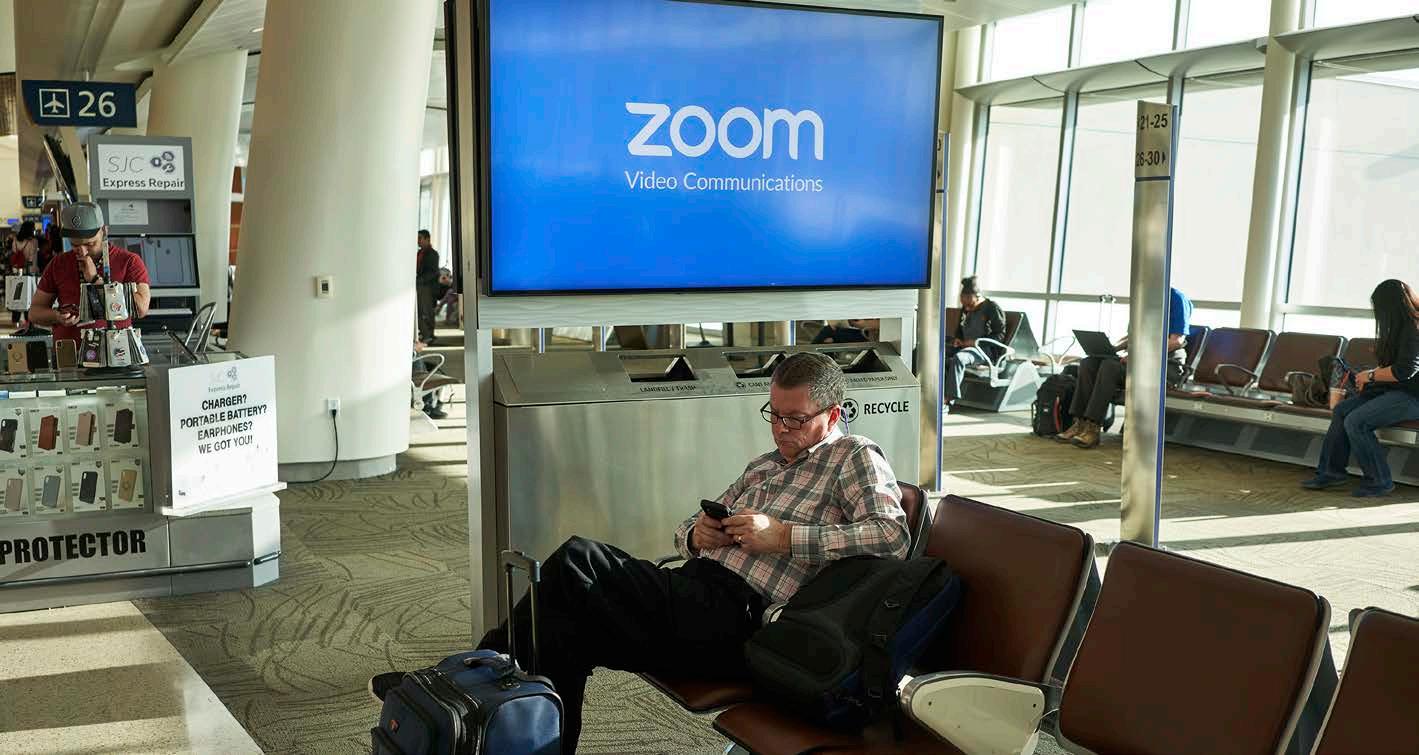
9 minute read
Airlines - Mike Gough
TREADING WATER
We just need to keep treading water until the forecast pilot shortage becomes a reality.
Advertisement
Life has an uncanny ability to remind one exactly who is calling the shots in the bigger scheme of things. Although 2019 was a little rough around the edges, I don’t think anyone in the aviation industry saw the massive fallout of 2020 coming.

THE fragility of the commercial aviation industry has been resoundingly demonstrated – with, of course a huge amount of hype, misand disinformation, along with a healthy dose of downright opportunism on several fronts.
I am obliged to express my dismay at the pandemic and sympathise with those who are afflicted or bereaved from this virus. Having said that, one’s sympathy capacity would be exhausted daily should we have to commiserate with every source of human mortality that has global statistics on daily lives lost.
The reach of social media made it through to my home office during the initial lockdown period, where I became a regular observer and occasional contributor on various platforms. What this exposure amply demonstrated to me is the level of herd stupidity that exists out there.
It most certainly is the emptiest drums that make the most noise, whether it be the pandemic, local politics, American politics or the bizarre indignation of rights groups attempting to defend the absolute indefensible. As for the conspiracies….
The end of March saw me preparing my hangar at Lanseria for an anticipated 21-day period of inactivity. Aircraft were neatly parked, batteries disconnected, and
pitot covers in place. I elected to remove most computer equipment from a theft perspective and ensured CCTV cameras were operative. Lanseria has a reputation for air-side pilfering, of which, in twelve years, I have not encountered first hand.
Due to the abrupt imposition of the initial Level Five restrictions, very few of my 80-odd foreign students could return home. This proved to be an inadvertent stroke of luck for my school as well as the students involved, as the few who did go home are now unable to (currently) return.
As we all frustratingly know, the lockdown has been handled in a socialist and secretive fashion, with irrational and bewildering regulations, promulgated outside of any form of Parliamentary oversight.
I was trying to explain to a prospective UK client that Woollies’ roast chicken was outlawed. He still doesn’t believe me, and it illustrates how far ideologically our cultures and mentalities are apart.
The 21 days ‘had’ to be extended as our government’s version of the Politburo began realising their opportunity to be illegitimately in complete control of all things legal and illegal. Two weeks’ into the 21 days, I discovered that due to the incredibly poorly drafted ‘regulations’, I could legally continue operating my AMO
Airports are empty but can video conferencing ever replace the face-to-face experience?
(Approved Maintenance Organisation) as an essential service. LOL.
Of course, I duly printed out the CIPC certificates, access permits and various other non- sensical documents that our powers-that-be deemed to be essential to confuse and ward off the virus.
This devious disease must have fallen for this brilliant strategy, as we kept going with scheduled maintenance as well as some long-term projects that needed a little down-time to complete, without a visit from the Grim Reaper.
We were, however, visited almost daily by the Lanseria based South African Police Service (SAPS) as they were both suddenly lonely and bored with the total cessation of all airport activity, as well as curious as to what was happening at Hangar 30.
To say the airport was a ghost town would have been an understatement, and I’m sure all the long-term resident ghosts (of which there are a few) must have felt comfortably at ease.
The SAPS, however, had varying interpretations of the so-called regulations, and while grudgingly accepting my homeprinted permits, they made a point of harassing me and my staff on a regular basis. I wasn’t quite up to the challenge of sneaking a quick photo of the full riot gear-equipped guy complete with automatic firearm standing in my office, accepting my offered bottle of hand sanitizer…
I found locking all the doors once we were in was the most effective way of being left alone, as they gave up after five minutes of banging on the door. So, we limped along, resigning ourselves to more of the same when the initial lockdown was inevitably extended.
Our students in our accommodation provided us all with lessons in Google

Classroom, Zoom and Teams. All I can say about these various platforms is that they are absolutely no substitute for actual face-to-face, whether it be classroom time or meetings. I cannot see this technology making a serious dent on future business travel as it completely takes away the gravitas of any serious interaction.
Which brings me to the burning question.
When will air travel demand get back to normal? Will we have to accept the socalled ‘new’ normal of a post-Covid airline landscape, of which no-one actually can offer a rational description?
We are all simply guessing as to the rate that the industry will get back to some form of what it used to be.
IATA has done their usual statistical forecasts and updated their figures regularly. If there is someone’s crystal ball-gazing to take with any seriousness, it should be theirs.
In a nutshell, Revenue Passenger Kilometres, or RPKs, is but one of the many units that clever airline types use to measure various aspects of the performance of airlines globally. It is obviously important to use a metric that reflects both airline and passenger activity. No point in flying around empty seats, which would be Available Seat Kilometres (ASKs). The former is essentially “bums in seats”.
Thus, IATA postulates that by December 2021 (around 16 months from now), we will be around 80% of preCovid levels of RPKs, although with an interestingly shorter average trip time. This indicates that passengers will opt for less Ultra Long Range flying and make trips with shorter ‘hops’. This equates to more flights to do the same job, and with logical inference, requiring more crew for the same pre-Covid level.
IATA’s chief economist, Brian Pearce, also forecasts that Gross Domestic Product (GDP) will leap ahead of the 2019 levels at an impressive rate, ahead of the RPK forecast by some distance. This, he attributes to global governmental intervention in the economy. Global GDP levels will exceed the 2019 threshold by the end of this year – a mere four months away.
We are set to exceed pre-Covid levels of RPKs by the end of 2022. This, I must point out, is the downward revised estimates.
Mr. Pearce creates a neat bar-graph comparing various governments around the world as to what percentage of domestic GDP the economic interventions have totalled. Unsurprisingly, South Africa is stone last with around 1% - compared to Germany’s 35% at the top. At least, I suppose we make it onto the chart in the first place, and we are the only African nation there.
Where does all this leave us, the formally pampered and much coveted air crew? Well, that pampering and coveting is very much a thing of the past, and the majority of us have not received an airline
salary since April.
One of the methods of getting rid of pilots has been incentivising, and in some cases, forcing early retirement of the over58s. We were previously looking down the barrel of a massive spike in retirements by 2024. FAA figures indicated that 42% of the US ATP workforce would have retired by that year.
So all we have done is move this forward significantly. Allow me to use my bad mathematics to mangle the statistical forecast. Let’s assume that we now have a higher percentage (due to the lower age of 58) entering retirement as I write this. In 16 months’ time, we might only see 20% of these people electing to return to the industry that shoved them out without too much compassion.
Thus, we are back to 80% of capacity, making many more flights daily, with 30% less crew available. And then two years later, that 20% starts dwindling due to the original retirement train smash.
That so-called pilot shortage has only been momentarily delayed, and it will hit the industry with a vengeance in the near future. We all just need a means of treading water for a while. Interestingly, not one of the incentive schemes for ‘cadet’ training by the US majors has been cancelled. United’s program, which selects suitable screened non-pilots, and then places them on the payroll while being trained, has been slowed down somewhat. Their own forecasts indicate the problem has only been delayed by Covid, and not eliminated by any means.
If I look at my own situation at my flight school at Lanseria, I have to raise an eyebrow in some disbelief at the resilience of the abinitio market. The first month of us being allowed to resume flight training saw our record month since we opened doors twelve years ago – just short of a thousand flight hours completed. July was similar. August will be slower as we deal with the seasonal changes and generally stronger winds.
I have a considerable contingent of eager students waiting overseas for our borders to open, and am taking enquiries on a daily basis, the likes of which I have never seen.
Am I being the silver-tongued salesman when I talk up the prospects for new pilots to be entering the training industry under the current conditions? To a certain extent, yes, although looking at the data above, where will we be in three years’ time if we shut off the training ‘pipeline’ now? Probably in very deep trouble, crew-wise.
Those who are completing their Commercial Pilots licence now will still need some form of activity to boost their logbook totals. Flight instruction is the only method I can offer the industry, and due to its apparent lack of fear for the future, there are plenty of candidates to train. So far, it looks very self-sustaining.
Those who commence training before the end of this year, will need at least three or four years before they are of any use to the airline industry, and by then, we will have a massively different dynamic in play to what we appear to be mired with at present.
What was that saying about the future being so bright, we need Ray-Bans…?







